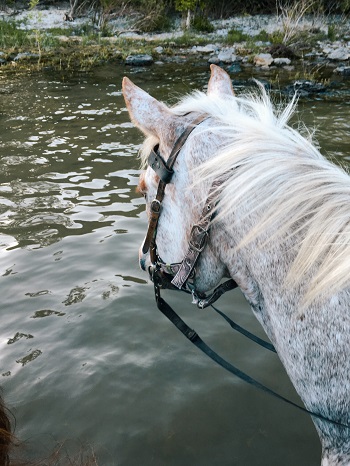As you likely know already, horses have at least 10 times our strength. If they also had our intelligence, they would probably be riding us instead of us riding them, but fortunately, horses cannot reason like human beings. Since they don’t have reasoning abilities, horse training can be challenging because it requires the trainer understanding how their intelligence works. You must know what works and why to really be effective.
The biggest secret that makes it possible to train a horse is the fear of pain and/or punishment that our is instilled in their mind. We can use that built-in fear to our advantage and teach the horse what we want him to do. The trick is to not push the horse too far with his built-in fear. We must never abuse this knowledge because it will backfire. And once it backfires, then we will have problems with the horse that is being trained.
How Does it Backfire?
Let’s take a novice horse owner who fulfills his dream to have horses and train them. Unless he’s studied a horse’s nature he will probably get into trouble with his horse because of the delicate balance of the horse’s built-in fear. For instance, the very first lesson you must teach your horse is to have confidence in you. If your horse doesn’t have confidence in you, he will never trust you. Think of confidence in this way. If you’re a child who’s just seen a scary movie you probably want to sleep with Mom and Dad for the night. You know they will protect you and that you will be safe with them. But if you didn’t feel like your parents would keep you safe you wouldn’t have confidence in them, would you? A horse’s thinking is like that. He must have confidence in you when you’re working with him.

A horse can be taught confidence in different ways. This is the most important lesson of all, and it is also the easiest. Essentially, the confidence lesson takes advantage of, but never abuses, the horse’s built-in fear. In a way, the fear is harnessed and carefully used to create the confidence the horse has in you. It’s like getting a child to watch a scary movie and being there to protect him or her when they get scared. When the horse experiences the fear, you’re there to save the day. You make it so he depends on you to be his superhero. When the horse gets fearful, you must be there to tell him everything is okay. You do that through petting him. Talking to him in a soothing manner and using a pleasant tone of voice.
I have a friend, Gene, who loves his horses but when they don’t do certain things, he thinks they should do, he punishes them. By punishing, I don’t mean he hits or whips them. A horse can feel punished just by a threatening tone of voice for example. I rode with a group of people one day and Gene was in our group. We came upon running water that was about 30 feet wide and varied in depth from a foot to three feet. Every horse crossed the water but Gene’s. Gene got so upset that his horse wouldn’t cross that he began booting his horse in the ribs. That poor horse wanted to comply with Gene’s request, but the running water scared him. The horse was spooking. The horse paced back and forth, occasionally sniffing the water but never crossed it. The whole time Gene’s legs were wildly kicking the horse trying to get him to cross – yet the horse remained spooky.
What Gene didn’t realize is the horse was fearful and needed his help. Anytime a horse is fearful of a place or a thing he should be reassured with a pleasant, soothing voice and/or petting him. If you do what Gene did, all you do is give your horse another thing to fear. Not only does that horse fear crossing running water, now he fears he’s going to be punished for it. And it’s likely that anytime the horse comes upon running water both fears will crop up and Gene will have a horse that would like to comply, but his instincts are so powerful that he probably won’t.
Think of it from the horse’s point of view. You’re a horse that cannot reason and your instincts are self-preservation. What keeps your self-preservation in check is the built-in fear. Fear makes you run from danger. Fear is what keeps you alive. If you don’t understand something, you fear it even more. Now knowing all that, imagine you’re the horse and you’re standing at the edge of the river. You won’t cross it because you think there’s danger in it somehow. On top of that, someone is on your back, angry and kicking you in the ribs because you won’t go forward. Not only are you scared of the water, but now you’re getting kicked in the ribs and feeling punished. You want to be obedient and go forward but your instinct is too powerful and tells you not to. It would be like telling a scared child who just saw a scary movie that he had to sleep in his own room.
But what if Gene had understood his horse was scared? What if he helped his horse deal with his fear. How would he do this? When Gene and his horse approached the water, he could have spoken to his horse in a pleasant, soothing manner. When the horse was getting scared Gene should have recognized it as fear and not as disobedience. He could have petted his horse to reassure him all is okay. He could have talked to his horse in a pleasant manner. He could have let his horse sniff the water and check it out on his own. Instead, the horse was now confused, scared, feeling punished, less trusting of his rider, and who knows what else. But if Gene would’ve recognized the fear in his horse, then he could have helped his horse overcome it. Gene lost the opportunity to gain a significant amount of the horse’s confidence and friendship in that river scene.
Andy Curry is a nationally known horse trainer and author of several bestselling horse training and horse care books. For information visit his website at HorseTrainingAndTips.com.
Related Articles & Free Email Newsletter Sign Up
How to Get an Abused Horse to Trust You
The Importance of Habit and Repetition During Horse Training
The Importance of Riding in Rhythm with Your Horse




Comment here